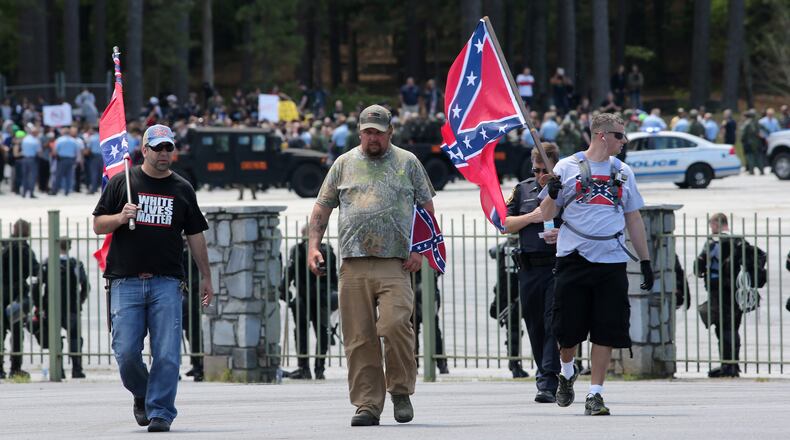Nearly a year to the day after a young white man gunned down nine black members of a prayer group in Charleston, S.C., and 10 short miles from the racial hot spot of Ferguson, Mo., several thousand Southern Baptists will gather next month for their summer convention.
Just as they do every June.
But this meeting in St. Louis may be like no other. “Messengers” representing America’s largest Protestant denomination, still overwhelmingly white and with roots in an early 19th century dispute over slavery, could be asked to endorse a ban on the public, government-sponsored display of the Confederate battle flag.
That’s the same flag that 21-year-old Dylann Roof posed with on Facebook, time and again, before walking into “Mother” Emanuel African Methodist Episcopal Church with the aim of starting a race war.
Passage of the resolution would be an important milestone in the Southern Baptist Convention’s long struggle to come to grips with its origins — and expand its appeal to minorities. But as the strongest religious conservative condemnation yet of what the Confederate banner has come to represent, support for a ban on public display would also send shockwaves across the South.
Though an SBC resolution would be binding neither on congregations nor its 15 million members, heritage forces that want to keep the battle flag flying at Stone Mountain Park, for instance, would be deprived of an important acre of moral high ground.
Such a move would also give succor to politicians who stepped up in the days after the Charleston massacre, like Mississippi House Speaker Phillip Gunn, who has unsuccessfully argued for removing the Confederate battle emblem from his state flag — as Georgia did in 2001.
The flag resolution was submitted last month by the Rev. Dwight McKissic, senior pastor of the SBC-affiliated Cornerstone Baptist Church in Arlington, Texas. He’s African-American.
“Mother Emmanuel caused me to read more about the history of the Confederate flag than I’d ever read before,” McKissic said in an interview this week. “The continued use of that flag needs to be clearly repudiated by Bible-believing Christians.”
“Certain Southern Baptists” have argued that the flag is too closely tied to Southern culture to give up,” the Texas pastor said. “Well, parts of Southern culture were evil and wrong.”
Approval of his resolution would be an important signal, McKissic said, from “a respected, white, Bible-believing organization — that God does not approve of racist attitudes.”
Though it won't become full-throated until messengers assemble in St. Louis, the debate has already begun. On SBC Voices, a denomination-oriented blog, McKissic emphasized in a post on the topic that the resolution would be aimed only at Confederate flags on public ground. "Where this flag is displayed on private properties, it is none of my business, unless those who wave it claim to belong to God's Kingdom," he wrote.
A moderator ultimately shut off commenting on the post, in part because of the “racist” tone of some critics.
Once a fierce defender of segregation, the SBC has broken with its past before, in 1995 passing a resolution repudiating and repenting of its role in the chattel slavery that the Confederacy was intended to preserve. Last year, delegates approved a resolution encouraging more racial and ethnic diversity in the denomination.
Most important to the June debate will be the writings produced by Russell Moore, who heads up the public policy arm of the SBC, in the days immediately following the Charleston killings. "The cross and the Confederate flag cannot co-exist without one setting the other on fire," the Mississippian wrote last summer, calling for the banner to be permanently furled.
“There’s certainly support for the idea, the concept,” said Moore, president of the SBC’s Ethics & Religious Liberty Commission, in an interview on Thursday. McKissic’s proposal is now in the hands of a resolution committee — Moore will be participating in an advisory role.
The 10 members of the committee could pass the proposed resolution out unchanged, edit the wording, or block the initiative altogether. Even if that last option comes to pass, a delegate can revive the resolution from the floor.
Now, about that resolution committee: Its make-up is why the St. Louis meeting could have national import.
Several prominent Baptist pastors are included, of course. But also among those who will pass early judgment on the Confederate battle flag are ranking executives with both the Family Research Council and the National Religious Broadcasters, both highly influential groups among religious conservatives. Then there’s Mat Staver, attorney for Kim Davis, the Kentucky county clerk who refused to process marriage licenses for gay couples.
At least one member of the resolution committee is African-American: Kelvin Cochran, the former fire chief fired by Atlanta Mayor Kasim Reed, who says he was wrongfully sacked by the mayor because of his religious views. Cochran is now associated with Elizabeth Baptist Church in Atlanta. Efforts to contact him were unsuccessful.
Moore understands that the topic and the calendar will put Southern Baptists under an extremely bright spotlight next month, but he's optimistic that something will happen. For one thing, Hispanics and African-Americans are now the most rapidly growing demographic sector within the SBC.
“There’s a great deal of concern for racial unity and reconciliation that is grounded in theology,” the Baptist executive said. “At least in the past several years, the SBC has been a place of unity – and surprising unity. I expect that will be the case here as well.”
About the Author
The Latest
Featured




